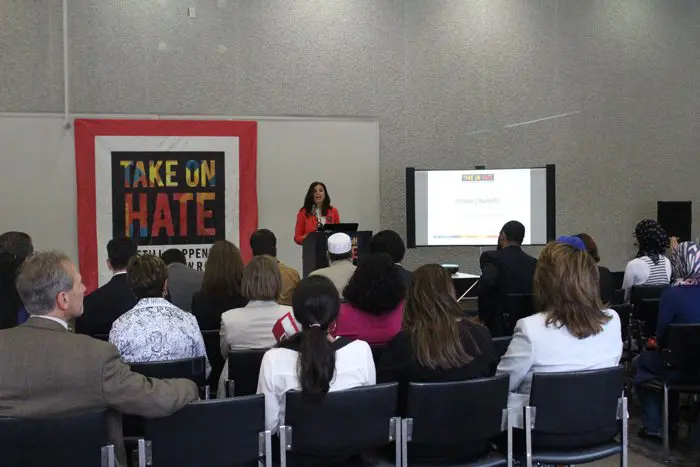
DETROIT — On Monday, June 23, the National Network for Arab American Communities (NNAAC), a project of ACCESS, launched a campaign that aims to combat institutional and social discrimination against Arab and Muslim Americans. The Take on Hate Campaign was announced at the offices of the Michigan Department of Civil Rights in Detroit.
Representatives of civil rights organizations, community members and local officials attended the inaugural ceremony of the initiative.
Nadia Tonova, the director of NNAAC, which is composed of 23 organizations in 11 states, said the idea for the campaign started two years ago when the network saw that bias in the media and discrimination are a growing concern for Arab Americans across the country.
She said the campaign aims to change seven specific federal policies, correct the perception about Arabs and Muslims through education and increase the community’s capacity to organize against discrimination.
“We are excited to work with other organizations,” added Tonova. “We want to get more people involved. It is a grassroots campaign.”
The federal policies that the anti-discrimination project targets include implementing oversight over national watch-lists and creating a mechanism for being removed from them; conducting congressional hearings around post 9-11 abuses and profiling; establishing an official National Hate Crimes Taskforce; and ensuring that the Department of Justice opens an investigation into unwarranted surveillance by local police departments.
Tonova said the campaign will work with school districts and supply educational materials about Arab and Muslim cultures. It will also hold diversity training sessions for law enforcement officers to increase sensitivity and awareness of the community.
“We have to be bold,” Tonova said in a video for the launch. “The people who are perpetrating hate or bias or stereotypes against us are not afraid to use bold action, and we can’t be afraid to use that, either.”
The Take on Hate Campaign is a national project. It was launched in Washington, D.C. in March and in San Francisco in April. NNAAC will also launch the campaign in New York and Chicago later this summer.
NNAC cited the rise of hate crimes against Arab and Muslim Americans and the closure of bank accounts of entrepreneurs in the community as examples of discrimination.
“According to a report released by the FBI, anti-Islamic incidents were the second least reported hate crimes prior to the terrorist attacks of Sept. 11, 2001; following the attacks, they became the second highest reported incidents, with a growth of 1,600 percent,” the network said in a statement.
“Recent examples of both hate and institutional discrimination toward Arab and Muslim Americans include vast and unwarranted bank account closures across Metro Detroit, the burning of Qur’ans near a mosque in Dearborn, and what the U.S. Equal Employment Opportunity Commission (EEOC) found to be discriminatory hiring practices against Arab Americans within a Dearborn Heights school district last year.”
Tonova said bigotry, in all of its forms, should not be tolerated.
“It’s time to confront the ‘acceptable bigotry’ toward Arab Americans,”she said Monday. “Judgment, profiling, slandering, making jokes, no matter how it’s delivered, it’s still hate. It’s still happening. It’s still wrong. Take on Hate moves us closer to being a nation that upholds dignity and equality for all — regardless of national origin, ethnicity or religion.”
Matthew Wesaw, the director of the Michigan Department of Civil Rights, said the campaign is chance to reaffirm the commitment to defend civil rights.
“For more than 50 years, the Michigan Department of Civil Rights has been responsible for enforcing civil rights laws and working to prevent discrimination,” he said. “The Take on Hate campaign is a great opportunity to say loud and clear that the consequences of hate are real, and to tell victims of discrimination that we stand at the ready to investigate any violation of their civil rights.”
Dawud Walid, the Michigan director of the Council of American Islamic Relations (CAIR), said in a video for the launch that discrimination against Arabs and Muslims is driven by hate from people who do not know our communities; engaging and educating people would erode that feeling.
Nabih Ayad, chairman of the Arab-American Civil Rights League, said “Take on Hate” is a campaign “worthy of support.”
“We stand in solidarity with the Take on Hate campaign and the National Network for Arab American Communities, in effort to put some power behind this initiative in order to have a collective force,” he said. “We are really being treated as second-class citizens, which is unacceptable. It’s unconstitutional. What makes this country so great is the Bill of Rights, and we demand our constitutional rights just like any residents in this country.”
Karry Moss, the Michigan director of the American Civil Liberties Union (ACLU), said ignorance can fuel “horrible things” in society.
“It is important that there can be a space where that can be talked about and addressed,” she said. “The campaign to Take on Hate seems like a really innovative initiative to bring together people to focus on one of the more compelling problems of living in America, which is how to allow every person to live to their fullest capacity, to realize their dream, to realize the American Dream and to be the best they can be.”
The Detroit launch of the Take on Hate Campaign coincided with the 51st anniversary of Dr. Martin Luther King’s “Walk to Freedom,” which took place in Detroit on June 23, 1963.
The march, where Dr. King delivered a moving address that became the precursor of his iconic “I have a Dream” speech in Washington, D.C., drew an estimate of 125,000 people and was the largest civil rights demonstration ever organized in the United States at the time.






Leave a Reply